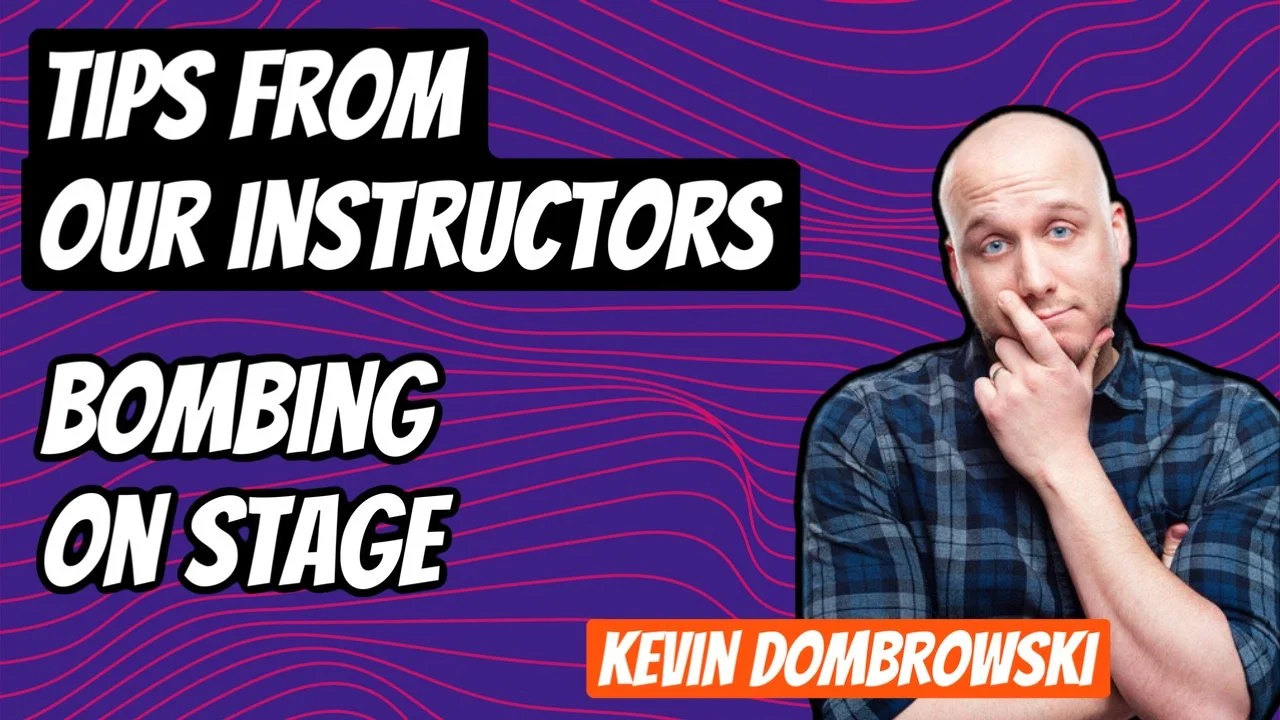TAKING THE stage
FROM JEFF LAWRENCE
(Stand up comedian, singer/songwriter, MasterChef contestant, and founder of Laughing Buddha Comedy)
Bombing on stage
FROM KEVIN DOMBROWSKI
(Instructor of our Advanced Stand Up Comedy Workshop)
OPEN MICS
FROM DARYN PASSARELLO
(Director | Booker of Laughing Buddha Comedy & Instructor of our Stand Up Comedy & Writing Workshop)
WRITING TIPS
FROM JOHN REYNOLDS
(Emmy Award Winning Writer, Instructor of Writing for Late Night TV)
Make a habit of writing one really good topical joke per day. That way when a packet is asked for, you've already got a head start.
After you've edited a joke down, challenge yourself to lose one more word. You'll always find it.
Try to think of a joke using a subtopic of the headline for the set up rather than just the headline. This will help lessen the chance of you doing the same joke as everybody else.
Acting TIPS
FROM David Mills
(Instructor of our Acting for Stand Ups Workshop)
Acting is reacting. Actors are just reacting onstage to other actors, their circumstances, the world of the film or play. Stop acting and start reacting.
Spencer Tracy said “The trick to good acting is to learn your lines and don't bump into the furniture.” As a comic you already know about being authentic onstage, acting requires being authentically yourself while playing a character at the same time.
TIPS FOR COMICS
FROM KEVIN DOMBROWSKI
(Instructor of our Advanced Stand Up Comedy Workshop)
Get out on the road, rent a car, open for a headliner
Practice crowd work, learn to work your material in between
Remember that hecklers just want attention, give them a little, make it funny then move on. A good club will have personnel to handle anyone that wants to take it further.
10 Writing Tips
FROM JEFF LAWRENCE
(Stand up comedian, singer/songwriter, MasterChef contestant, and founder of Laughing Buddha Comedy)
No one goes to a comedy club to hear jokes. If that were the case you could read a greatest hits joke book and kill. They go to a comedy club to feel better about themselves, your connection with them will accomplish that, the jokes will cement that.
Your act needs to be highly original and your choice of material will define your career.
You should write at least one hour a day. Even jotting down bullet points for ideas is writing. Spending time thinking about punches is writing as well.
Only the audience can tell you if a joke is funny. Seasoned comics can tell you if a joke is well written but not if it's going to be funny to a given audience.
Don’t settle for an average laugh. A lot of comics cling to “B” material and say “it gets a laugh”. An average laugh will get you nowhere. Punch it up or ditch it.
Be highly original. NO ONE should be able to do YOUR jokes.
I was once told to write material that I can do in Minnesota 5 years from now. The point being that your core set does not expire (like topical jokes) and can relate to a mainstream audience, not just a NYC audience.
Make sure your topics and choice of material inspire you, if not you will be more likely to grow tired of it and quit. The #1 complaint I've heard from aspiring comics over the years is "I'm tired of my material." That's probably because you're playing it safe. Raise the stakes! Take Risks! Fuck the PC Police!
Work with others. Sometimes a killer punch is right in front of you, but you don't see it. Late Night TV hosts have a team of writers, you can have partners as well. Find someone who has got the "funny". They don't need to be a pro, just someone willing to work like you.
Live life! If your whole life is going to clubs and mics, hanging out with comedians, and never leaving your nest, you won't have much else to talk about.
TIPS FOR COMICS
FROM Luke thayer
(Instructor of our Stand Up Comedy Workshop)
Start with a dream, but once you decide to pursue this as a career, it's time to live in the reality of hard work. Write, perform, and think comedy all the time.
Have that notebook with you at all times (even if it's a notes app on your phone).
Write down every funny thought you have. No judgment, just write it down. At the end of the week, look over those notes and see if there is anything you still find funny and try it on stage.
TIPS FOR COMICS
FROM Daryn Passarello
(Director | Booker of Laughing Buddha Comedy & Instructor of our Stand Up Comedy & Writing Workshop)
Respect the light. The light (A red light by the stage or the showrunner's phone light) is a signal for you to start wrapping up your set. Do not go over your allotted time as any overages cause time to be taken away from other comics and staff on the show.
When preparing a 5 minute set, time yourself for 4 minutes and 30 seconds. Allow time for laughter and audience reaction. This will help you avoid going over your allotted time.
Read every e-mail fully that a booker sends to you. Most details and answers to your questions will be included in that e-mail. If the e-mail requires you to respond with a confirmation, do so. As well, if you're confirmed for a show and for some reason you can no longer attend, contact the booker and let them know.
10 hosting
tips
FROM LBC
Your job is to warm up the crowd, don't worry about crushing which is tough to do as the opening act.
Always check with the producer/booker/manager for announcements, birthdays, etc.
You'll get more work if you work clean.
Practice crowd work when you have the opportunity; it is invaluable and there will be situations where you have no choice.
When doing crowd work always repeat back what the audience says.
Learn to level the room; bring it down if someone crushes, and bring it up if someone bombs.
Have access to a car for road work.
Always arrive early and don't drink or do drugs; you are now being paid to work.
Make sure you know how much time to do in between acts if any.
Be an asset to the club or booker. i.e "Do you need help with anything"? goes much further than "how many drinks can I get for free".
mic
techniques
FROM LBC
The mic will be in the stand already when you arrive on stage.
Fist bump/dap/shake host’s hand.
Don’t worry about messing this up, it will feel more natural over time.
Take the microphone out of the stand and move the stand to the side and behind you so that you are not upstaging yourself.
Don’t play with the mic cord, its just distracting and shows nervousness.
Don’t bang the mic on your head or the floor or anywhere else. This is club property and it makes some owners really MAD!
When you leave the stage make sure the mic is back in the stand and centered so the host doesn’t have to do this. It’s OK to hand the mic off to the host when you’re brand new, but learn to be self sufficient.
10 stand
up Tips For Success
FROM LBC
The only person(s) who can tell you if a joke is funny is your audience.
#1 Rule: Have Fun! The audience feels what you feel. If you panic, they panic.
Working clean can get you more pay and work. At the least have the ability to work clean.
There’s no such thing as a bad mic or bad stage time.
Say the things you don’t think you can say, that’s your comedy gold.
Don’t give a damn what other people think and don’t be a people pleaser.
Mine the deeply personal stuff. Go where the struggle and pain is.
Never tee up your material - no disclaimers, transitions, or defenses. (i.e. “I know what you’re thinking”.)
Be yourself, be vulnerable, be real. Stand up is about being imperfect.
There may be shortcuts to fame, but there are no shortcuts to being a master of the craft.
10 Tips for
Success
pt. 2
FROM LBC
Open strong with a joke, don't waste time.
Have a strong point of view/opinion and be an expert on your subjects.
Defend yourself and your material at all costs.
Stand up is your struggle, always maintain a sense of urgency.
Embrace your bombs, never bail on your set. Look at bombing as a golden opportunity to turn things around; this will build confidence.
There is no such thing as bombing at a mic, give yourself permission to fail.
Move on stage with purpose, no nervous energy (pacing, looking at the floor)
Write every day, even 10 minutes if you haven't all day.
Always save and archive your writing and ideas, you may find material years later worth revisiting.
Practice patience: becoming a professional comedian takes many, many years of hard work and dedication.
ALWAYS Tape YourselF
FROM jeff lawrence
In 2009, I, along with a few of my comic friends were privileged to meet the wonderful Joan Rivers backstage after her set. I was nervous, I’ve always been a huge fan, what would I say? After her set we went backstage to her dressing room and upon entering she asked, “are you the comedians?” We nodded. Her first words of advice: "Always tape yourself....if you don't, you won't make it". And there she was just minutes after finishing her set, methodically going through her notes, with a tape recorder listening to the audience reaction of a set she had just finished. This is how it’s done!
If you're able to videotape every set, even a mic, that is optimal. At the least audiotape yourself. Watch your body language, your eye contact, and how you appeared on stage. Were you talking too fast? Did you step on your laughs? Were there laughs you didn't plan on receiving? These are things you probably won't be aware of when the spotlight is shining and the adrenaline is flowing. Think of it like a football team. You must watch last week’s game to learn from your mistakes, and you must study next week’s opponent to prepare for them. Without that the team is going to lose. A videotape will give you the opportunity to examine and reflect on your performance objectively so you can make adjustments and improve your set time and time again.
P.S. She also said, “Don’t ever steal! That fucking Robin Williams and that Fucking Jackie Mason!”
Well, all three are dead so I guess I can say this now…
















